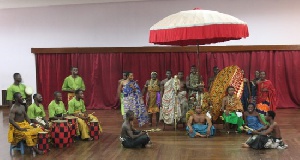Political instability in the 1980s destroyed the theatre industry in Ghana, veteran actor David Dontoh has said.
“There was no National Theatre, so, we acted at the Arts Centre in Accra. Military coups over the years destroyed theatre arts in Ghana. During a coup, there is a curfew, so, maybe, from 6pm to 6am, everyone was to stay indoors, sometimes the time is shifted from 8pm in the evening to 6am in the morning because the military were patrolling town at those hours, and that is what killed the entertainment industry,” he told DJ Premier on Entertainment Capital on Accra 100.5fm Saturday April 23.
“[At] first, people could get up and say they are going to the dance [disco], but the coup destroyed theatre and dance. A lot of activities done in the evening came to a halt.”
He said the industry players were no longer interested in theatre after the coup had come to an end, which affected the creative arts industry.
Mr Dontoh continued: “After the coups had come to an end and the curfews were over, the industry suffered because many of the industry players had travelled and others had lost interest, so, it became difficult to win the people back into theatre.
“When these were happening, many of those, who went to study theatre arts at the university had no place to work, so, they ended up in the banking industry and the security services.”
The multiple award-winning actor said he was the only practicing actor among his mates, who graduated from the School of Performing Arts at the University of Ghana.
To revive theatre in Ghana, Mr Dontoh said: “Accra has developed and expanded with about 11 sub-metros. Each sub-metro must have a theatre. Imagine if I live at Adenta and I want to watch a theatre performance, I need to come all the way to the National Theatre and go back, that will be inconvenient to many.”
He bemoaned the lack of cinemas in the capital and called for the construction of more cinema halls in the country to boost the film industry.
“We used to have a lot of cinema theatres all over Accra: Globe Cinema, Rex Cinema, Opera, Orbit, Roxford, and so on, but today we only have the Accra and the West Hills Mall cinemas. So, if I live at Sowutuom and want to watch a movie at the Accra Mall, look at the distance.
“In Accra, too, there are no staggered working hours – a system of working in which all employees do not arrive and leave at the same time, but have large periods of overlaps – and it does not help night work. When a person closes from work, before they get home and decide to freshen up and come back to town to watch a theatre performance, they will be exhausted, and that is what made video decks so popular so people could enjoy movies at home.
“Theatre starts from scripts, but how many people can live off script writing in Ghana. All TV stations are showing Telenovelas, so, who should write scripts,” he asked.
In his opinion, the Film Policy Bill, when passed into law, will revive the theatre industry.
“The Film Policy Bill before parliament, when passed into law, will mandate television stations in Ghana to show 70 per cent local content and 30 per cent foreign content. [If you] Fail to abide, you will be unplugged by the NCA. With this, TV stations will need content and they will contact a theatre group to produce and provide content,” added the Kukurantumi Road to Accra star.
Entertainment of Sunday, 24 April 2016
Source: classfmonline.com













